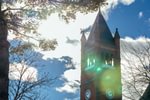

Within one year of graduation, 98 percent of Gettysburg students are either employed or pursuing further education. For Anna Malone ’16, Jason Spiegel ’17, Abbie Tootell ’17, and Julian Weiss ’15, life after Gettysburg meant entry to University of Pennsylvania’s highly competitive law school—ranked in the top 10 nationwide with Harvard, Yale, and Stanford University.
Penn Law espouses an interdisciplinary approach to lawyer training, similar to Gettysburg’s tailored course offerings and multidisciplinary academic majors. A cornucopia of academic departments here offer courses involving research, critical thinking, writing, and public speaking that focus on law. Course titles include Race, Gender and the Law, Business Law, Criminal Justice, American Trial, Philosophy of Law, and Legal Analysis.
We asked Gettysburg alumni studying at Penn Law to share their views on pathways to success. Beyond shared bonds of academic excellence, they are passionate believers in Gettysburg’s liberal arts focus.
Anna Malone ’16
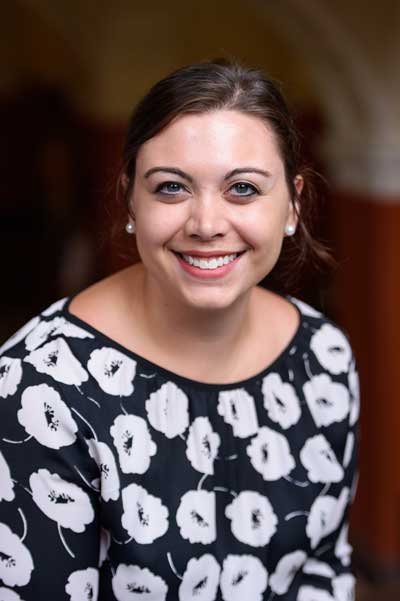 “One of the strengths of Gettysburg’s liberal arts foundation is that it gave me the freedom to pursue different things that interested me. By my senior year, I was doing a lot of research on criminal justice and connecting that to my philosophy major. For my religious studies capstone, I worked on a program with the county jail. How many schools would let a student do that!
“One of the strengths of Gettysburg’s liberal arts foundation is that it gave me the freedom to pursue different things that interested me. By my senior year, I was doing a lot of research on criminal justice and connecting that to my philosophy major. For my religious studies capstone, I worked on a program with the county jail. How many schools would let a student do that!
“My journey to law school is a bit unusual because I did not take advantage of pre-law advising at Gettysburg. As a first-year student, I decided law was not for me. But my philosophy and religious studies professors were very helpful by asking ‘the sky’s the limit, how can we help you succeed?’ That’s the part of Gettysburg that set me up for success: professors who invested in my future. Their advice helped me conclude that I wanted to get into criminal law—so I applied to Penn.
“The first year has been a lot of work, but a really fantastic experience. This is a very collegiate community. Everyone is willing to work together and help each other. I feel the same sort of comradery and community as I did at Gettysburg. When I visited Penn, my class escort was a Gettysburg student! Many of my close friends from Gettysburg live in the Philadelphia area and those relationships have been hugely helpful as I begin this new journey at University of Pennsylvania!”
Jason Spiegel ’17
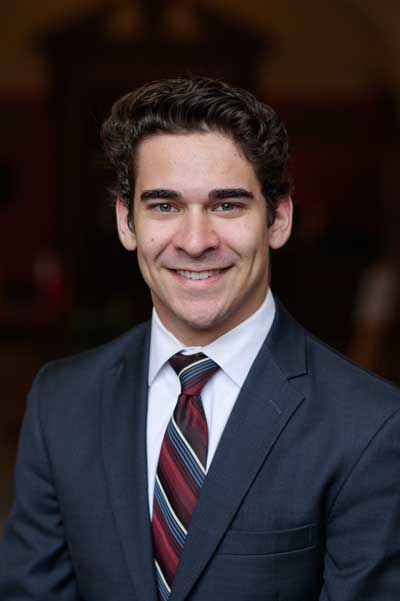 “At Penn Law orientation, they mentioned that there were only a handful of undergraduate institutions that have more than one student in the class of 2021. I’m really proud that Gettysburg is one of those schools.
“At Penn Law orientation, they mentioned that there were only a handful of undergraduate institutions that have more than one student in the class of 2021. I’m really proud that Gettysburg is one of those schools.
“My path from Gettysburg to Penn Law is relatively simple. Before coming to Gettysburg, I already planned to attend law school. I majored in political science and minored in philosophy; both subjects are well-represented in law schools. The liberal arts education at Gettysburg helped me prepare for the nature of law school classes. Being comfortable with expressing your academic thoughts clearly and respectfully is crucial in law school. Gettysburg helped me hone those skills.
“As a Fielding Center for Presidential Leadership Fellow, I worked directly with Fred Fielding ‘61, who mentored me in the law school search process. Mr. Fielding is a former White House Counsel. He is currently a partner in the Washington, D.C., office of Morgan Lewis, a law firm headquartered in Philadelphia.
“Gettysburg’s Sunderman Conservatory of Music as well as the Department of Theater Arts were also really helpful in preparing me for Penn Law. Their programs taught me how to express myself. I still find it therapeutic to perform and make music, which has helped me navigate the stress of law school!”
Abbie Tootell ’17
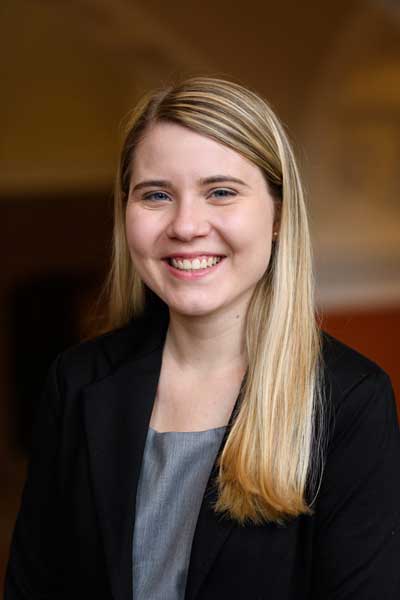 “I arrived at Gettysburg knowing that I wanted to attend law school. I thought Gettysburg was the best way for me to get there because of programs like the Eisenhower Institute. From an academic standpoint, I knew Gettysburg would allow me to pursue different interests.
“I arrived at Gettysburg knowing that I wanted to attend law school. I thought Gettysburg was the best way for me to get there because of programs like the Eisenhower Institute. From an academic standpoint, I knew Gettysburg would allow me to pursue different interests.
“I graduated with a double major in mathematics and political science—both immensely valuable in my legal education. On the political science side, I learned how to take a position and support an argument. On the math side, I developed logic skills and learned how to synthesize rules and theorems. My personal statement for law school was actually about how writing a math proof is similar to reading a court opinion or legal memo. Because I was able to pursue these different areas of study, I do believe there is a natural connection between the liberal arts and law school.
“With a growing number of Gettysburg alumni studying at Penn Law, I’m proud that we represent the value of a liberal arts education. Many of our law classmates attended large universities. I was shocked the first day of law school when I walked into a class of over 80 students! At Gettysburg, my largest class had 35 students. I’m proud of the education I received at Gettysburg and am inspired when I see other alumni succeed.”
Julian Weiss ’15
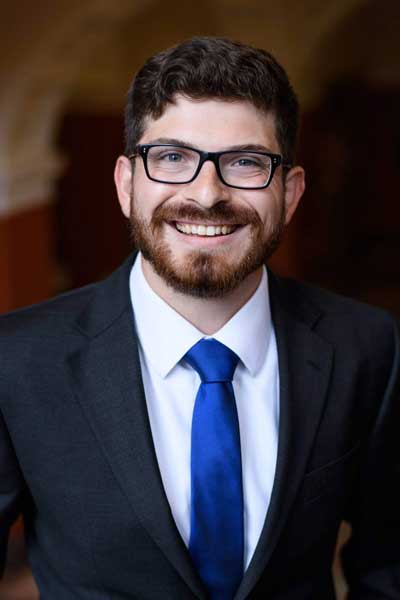 “My history major and Middle East and Islamic Studies minor were essential in enabling me to fully participate in and appreciate the study of law.
“My history major and Middle East and Islamic Studies minor were essential in enabling me to fully participate in and appreciate the study of law.
“Gettysburg's rigorous academic programs train students to do hard work. The College encourages students to challenge assumptions and draw their own conclusions. The real benefit of my liberal arts education is that it taught me to think critically about issues. It now allows me to challenge the motivations of litigants and judges and to see the outcomes of what sometimes seems like amorphous doctrine.
“My long and winding road to Penn Law started with political campaigns, a job in Congress, and moving back to Gettysburg to work with a consulting company. The skills I learned at Gettysburg helped me tackle new and formidable challenges at every stop along the way.
“Today, I see Gettysburg bumper stickers all the time when I walk around Penn's campus. It’s very exciting to see my alma mater, despite being a relatively small, rural school, so well represented at one of the premier academic institutions in the world. It is no coincidence!”
By Zeb Eckert and Marisa Balanda ’21
Posted: 04/09/19


